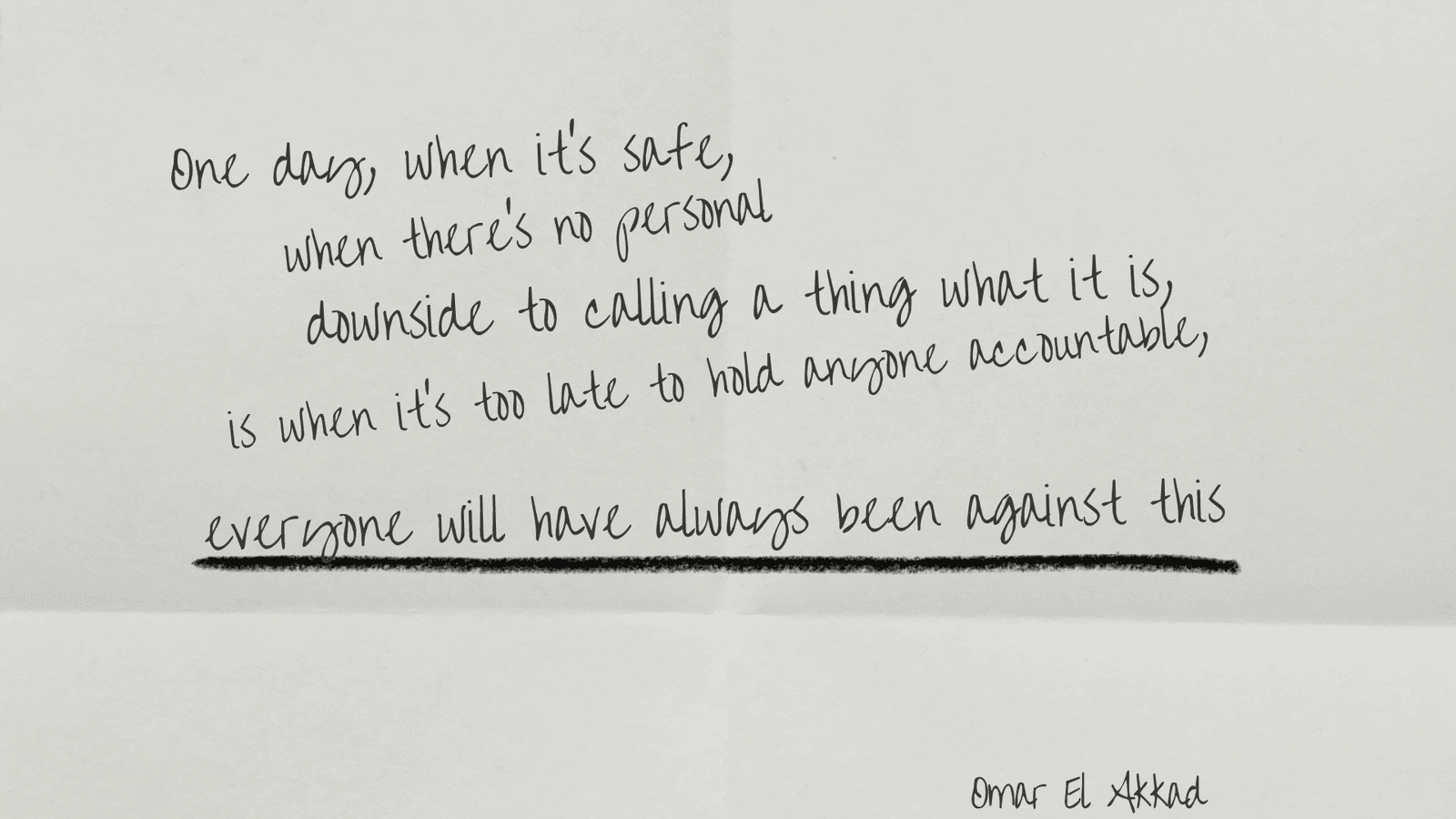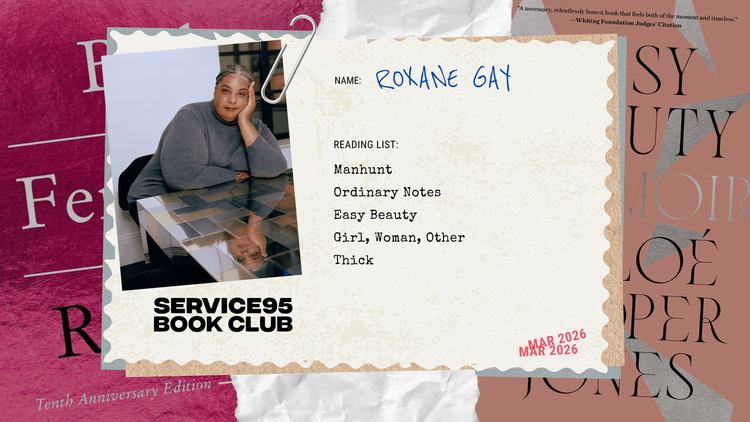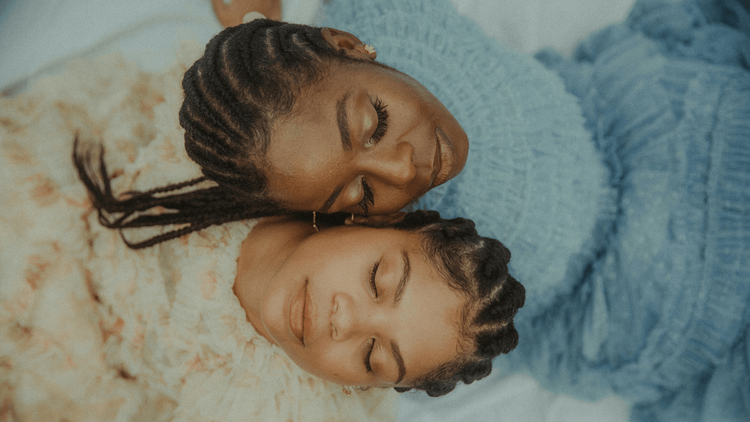Contrary to popular assumption, Omar El Akkad did not turn his viral 2023 tweet about the destruction of Gaza into a book. Though the resonant critique would be chosen as a title, One Day, Everyone Will Have Always Been Against This is a book the author had felt inside of him for a while. Throughout the book, Omar examines the contradictions of Western liberalism and media complicity during humanitarian crises, critiquing how political violence is justified through shifting historical narratives and how systems of power preserve themselves at the expense of justice and human dignity.

Born in Egypt and raised in Qatar before relocating to Canada as a teenager, Omar’s multinational upbringing has given him a unique vantage point from which to observe the contradictions of Western (and Arab) societies. He built his career as a journalist for Canada’s Globe and Mail, covering major global conflicts including the war in Afghanistan and the Arab Spring, along with the Black Lives Matter movement and the United States opioid crisis.
Now living in the US, Omar speaks with a rare clarity about what he describes as his “severance” from the Western liberalism that once anchored his worldview, particularly in response to the ongoing humanitarian crisis in Gaza. His latest non-fiction delivers a searing disquisition of Western liberalism and media complicity during humanitarian crises.

Here, Omar reflects on the emotional toll of witnessing atrocities, the failure of institutional systems and finding hope in collective resistance. With unflinching honesty, he examines his own position within the systems he critiques and raises questions about shared responsibility, suggesting that, as taxpayers in Western countries connected to harmful actions, we all bear some level of complicity.
Keshia Hannam: You use the word “severance” often when describing how Gaza is different from other conflicts you’ve covered. Can you explain why that is?
Omar El Akkad: One of the facets of this particular slaughter over the last year and a half is the immediacy, intimacy and complicity that are impossible to ignore. I wake up, turn on my computer and watch the worst things human beings can do to one another. I now know what it looks like when a little girl starves to death. And I did that, right? I killed those kids – my tax dollars paid for that. The immediacy and intimacy of what I’ve seen coming out of Gaza has made it impossible to live with the privilege of obliviousness that living in the heart of the Empire affords me.
KH: How do you feel emotionally right now?
OEA: It’s a difficult question to answer, because what I want to tell you is that I am completely and utterly broken as a human being. You can’t listen to the audio tape of a girl pleading for her life before being shot 355 times and come out the other side and worry about emails and meetings and whether the book is going to sell. I don’t care.
At the same time, I have to remember my neighborhood is still standing and my bloodline hasn’t been wiped out. Me sitting here telling you how hard this is for me is incredibly pretentious while human beings are suffering through their most brutal period of slaughter.
It’s been a very strange space in terms of feeling like very little of what used to matter still does, while at the same time being cognisant of the immense privilege implicit in being able to decide what matters.
KH: Thinking about the political implications of your book in relation to the current US administration, how do you see its relevance now?
OEA: I think one of the hallmarks of this administration, and any fascist administration, is there’s far less of a gap between what it pretends to be and what it really is. It was infuriating living under the Biden administration during this genocide and watching this performance of the desire for everlasting peace while the same administration funded endless war. That doesn’t exist to the same extent under Trump. As horrific as the next few years are going to be, there’s also going to be deep clarity, because we’re all going to know who is actually interested in standing up for the rights of everyone and who’s interested in keeping their heads down until somebody else does the work.
KH: Your background spans Egypt, Qatar, Canada and now America. Do you feel it is incumbent upon you to critique the West from this perspective?
OEA: I think it would be part of my mission regardless of where I lived. As a result of the kind of life I’ve had, where I’ve been a guest on someone else’s land since I was five years old, I have no particular allegiance to the concept of the nation state, or the sacredness of it.
Any place I’m at is subject to a kind of assessment that I talk about in the book as part of my contract of being here. Who am I expected to consider sub-human? Who am I expected to not think about? Whose suffering am I expected to turn away from? That’s the question I ask about anywhere.
KH: Your book wrestles with the beauty of human action that you’ve witnessed alongside institutional failure. Where do you stand on the idea of gradualism – the concept that people and institutions can evolve through education and exposure to different perspectives?
OEA: I’ve started looking at societies in terms of the reward-punishment equilibrium, because I think that dictates how a lot of people behave. The equilibrium used to be: if you keep your head down and don’t cause trouble, your reward is a house in the suburbs. We’ve hit a point for younger generations where that reward-punishment equilibrium has been torn apart. There is no house in the suburbs. There’s a good chance the earth is becoming uninhabitable. I derive courage from people younger than me who seem unbound by the restrictions of that particular contract.
KH: Do you still believe that the concept of democracy can be saved?
OEA: I absolutely think democracy can be saved, so long as it’s severed from or untethered from the compelling forces that are at their core anti-democratic. Endless corporate greed, for example.
KH: What practical action can people take to not be those who, one day in the future, were “always against this”?
OEA: I think everyone has to make the decision that this is important enough to be troublesome about. For a lot of people, the worst plausible thing is that they won’t get invited to that dinner party, or they’ll be thought of as the friend who’s problematic. Are you willing to be that person? The more people, particularly people served by the system, who decide they want to be that troublesome person, the more this conversation will be forced to change.
One Day, Everyone Will All Always Have Been Against This by Omar El Akkad is out now












